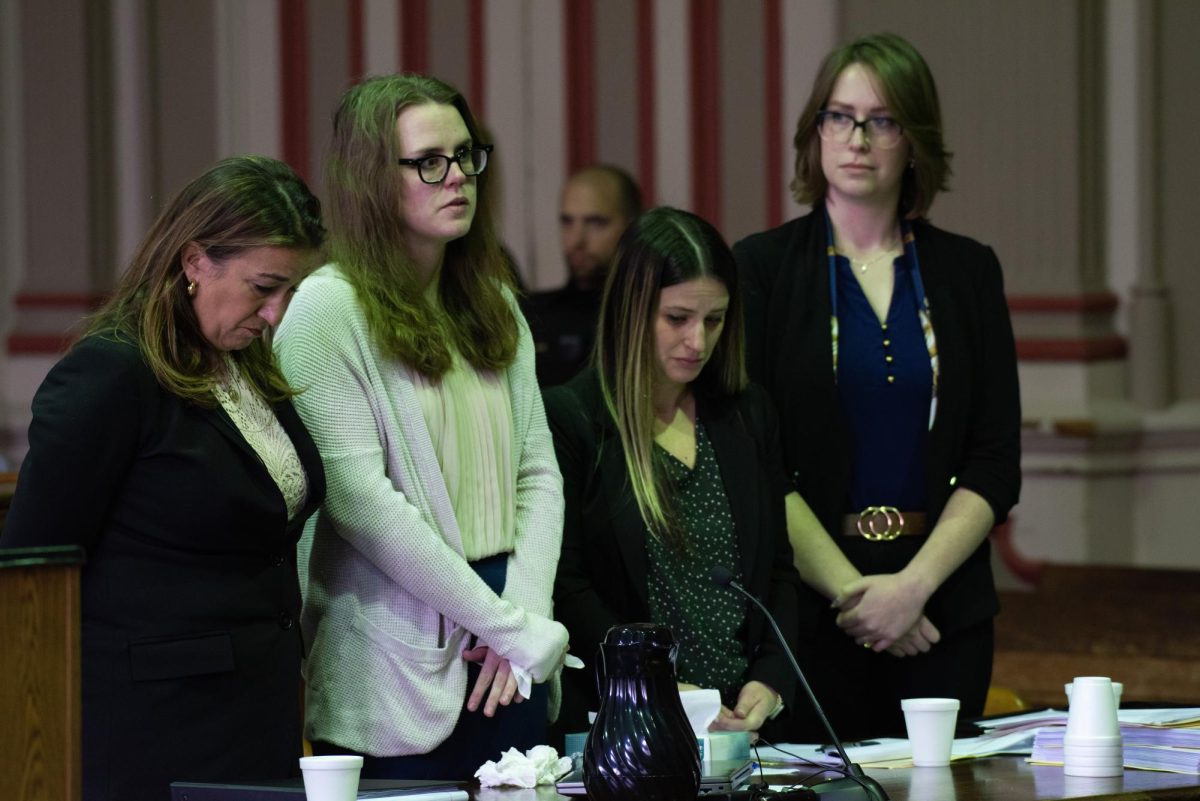A former Muskingum University student who made international headlines when she killed her newborn child, leaving it in a trash can alongside her sorority house, had her sentence significantly reduced earlier this month by a retired Cuyahoga County judge.
Emile Weaver, now 28-years-old, will remain behind bars for what will likely be the rest of her childbearing years, but not for the rest of her life, as she had originally been sentenced to in 2016.
The resentencing brings to a close a nearly decade-long appeal process for Weaver which ultimately hinged on an emerging field of human psychology that only time will tell if it’s substantiated as a scientifically sound medical science or unravels as a quackery.
Muskingum County Prosecutor Ron Welch rigorously challenged the expert witness, attacking her methods and research which to date has not been more thoroughly examined by the broader medical community.
After the conclusion of the hearing, Weaver’s attorneys and the expert witness could be seen hugging, high-fiving and standing together for pictures outside the courthouse steps, drawing further scrutiny to her impartiality in the matter, however, while that testimony likely gave Weaver another chance at a reduced sentence, which appeared to have a profound impact on the democrat judge from Cleveland, it was the comparison to other local horrendous crimes which received lighter sentences than hers and her unlikeliness to reoffended that reduced her sentence so drastically.
Emile Weaver was a 20-year-old sophomore at Muskingum University in the spring of 2015. Reports and testimony differ to the extent that she and those around her might have suspected or known she was pregnant, but what is clear is that Weaver had attempted to have an abortion before she delivered the child she was carrying, but a snowstorm derailed those plans.
On the morning of April 22, 2015, Weaver birthed her alive newborn baby daughter alone in the Delta Gamma Theta bathroom, at their sorority house on campus. Later she would place the baby, still alive and breathing, in a trash bag and tie it shut, causing the child to die of asphyxiation.
The investigation would continue for multiple months before Weaver was indicted by a Muskingum County Grand Jury in the Summer of 2015. She was arrested from her home in Clarington, Ohio and brought to stand trial.
She remained incarcerated from that arrest on July 22, 2015, until her trial in May 2016 where she was found guilty of aggravated murder, abuse of a corpse and two counts of tampering with evidence.
Weaver was ultimately sentenced to life without the possibility of parole, but that was just the beginning of what would become a nearly decade-long process of possibly reducing that sentencing or getting it vacated entirely.
Since she was arrested on that Wednesday in July 2015, Weaver has remained a ward of the criminal justice system in one capacity or another, for a little more than eight full years as of November 2023.
She would, through her post-conviction relief attorneys, argue that she had ineffective counsel at trial, argue that the sentence was disproportionate to her conduct and lastly, that she was a victim of a psychological condition that while rare makes young mothers susceptible to killing their newborn children.
It was that final challenge that ultimately is the reason Weaver got a chance at having her sentence reduced from life without the possibility of parole. That process took years, went all the way up to the Ohio Supreme Court and resulted in Weaver being resentenced twice, once by her original trial judge who maintained the life sentence then ultimately by retired Cuyahoga County Court of Common Pleas Judge Janet Burnside, a Democrat dropped into a strongly Republican county.
She was given the appointment in the final days of outgoing Ohio Supreme Court Chief Justice Maureen O’Connor’s term on the bench after recusing the sole-remaining judge in Muskingum County, Kelly Cottrill, after the case had been kicked back to the Muskingum County Court of Common Pleas.
Cottrill was recused to protect the appearance of impropriety and the public’s confidence in the fairness of justice due to the fact that when he ran for his seat in the early 2000s, there was a very similar local case and voters outed the Democrat judge, Howard Zwelling, for giving that mother who killed her newborn daughter only three years behind bars.

The resentencing of Weaver by Judge Burnside took most of the allotted day with nearly all discussion from both the prosecution and defense being focused on the sole expert witness, Dr. Diana Barnes.
Barnes is a psychotherapist with a focus on women’s reproductive mental health, she researches perinatal mood and anxiety disorders and is frequently retained by counsel on cases of pregnancy denial and neonaticide, the act of a mother killing her baby within the first twenty-four hours of birth.
Most of the examination by the defense and then cross-examination by the prosecution focused on how Weaver could have a fluid understanding that she was pregnant, meaning that in some ways, at some moments, she knew she was pregnant, but at other moments, in other ways, during the pregnancy, she didn’t think she was. Barnes said this was seen in other cases and would have required a profound grounding to reality that would have unequivocally resulted in her knowing she was pregnant, such as a urine or blood test.
Prosecutor Ron Welch, who as an assistant prosecutor with the office in 2016 helped prosecute the case at trial against Weaver, argued relentlessly against Barnes, identifying how her research and examination of Weaver would essentially allow a catch-all scenario that would justify the killing of her newborn child in nearly every instance.
Welch also pressed Barnes on her assessment of Weaver, in which she scored lower than others the doctor had examined, as well as how Weaver could call her child, on multiple occasions, a baby yet say she never fully accepted that she had birthed a child until its funeral.
The defense would argue that Weaver has one of the lowest likelihoods of recidivism and that continuing her sentence of life without parole would undermine the purpose of prison and the state’s laws which set conditions around the length of a sentence.
“Every day is a life sentence for Emile Weaver,” the lead defense attorney argued, citing how her client will have to live with the knowledge that she killed her own child.
They also cited the 2017 Muskingum County case of Dale Dudas who killed a homeless man in Zanesville with a brick but was sentenced to life in prison with parole after 20 years. Dudas had previously been to prison and had a lengthy criminal record.
While not directly taking on the comparison, Welch cited how the killing of an innocent newborn baby is one of the most senseless acts of violence that can be perpetrated by another individual.
“I stopped living at such a young age,” Emile Weaver said in her own defense near the end of sentencing. “I was broken by time I was 11 years old.”
She would go on to cite the death of her father and an absent mother that played a part in her floating nearly on autopilot through life.
“One decision could have made a difference,” said Weaver. “Unfortunately, that was too late for Addison.”
Judge Burnside, who first was a judge on the Cleveland Municipal Court in the mid-80s and then a judge to the Cuyahoga County Court of Common Pleas General Division in the early ’90s until her retirement in 2019, said it was an unusual sentencing.
She discussed how the law, enacted by the Ohio Legislature, set guidelines for judges and was made to ensure crimes are equally punished across the state while also protecting the public and ensuring those likely to recommit are weighted differently than those who aren’t.
“I find that she is not likely to commit crime in the future,” said Judge Burnside. “The court finds there is remorse.”
Burnside said she only had four options, life without parole, life with parole after 30 years, life with parole after 25 years and life with parole after 20 years. She also cited that the law says a judge is not to place an unnecessary burden on state or local resources by way of a sentence.
The judge, who served as an adjudicator of justice for felony cases in Ohio longer than Emile Weaver has been born, said that when she first got on the bench in 1991 there wasn’t a science at the time that could explain why women who were violently abused by their husbands stayed with them or why victims of sexual assault didn’t immediately run to the police.
“We are only still learning what is going on,” Judge Burnside said about expected human behavior and what is sometimes observed, often to the incredulity of the public.
She also cited the numerous letters she received, but it was the last one, by a fellow inmate, at the very end of the page that she said stuck out to her; ‘Emile is redeemable.’
It was at that moment that she looked at Weaver, paused for a moment and then handed down a sentence of life with parole after 20 years, instantly bringing tears to the face of Weaver, as her attorneys held her up.
Emile Weaver has served a few months in excess of eight years on her sentence, she will be released sometime in 2035 at the age of 40.
“We live in a community where people are held accountable for their actions whether good or bad,” Prosecutor Welch wrote following the new sentence. “Our office has spent more than eight years fighting for justice for Addison. While we accept the court’s decision, we believe the reduction of the defendant’s sentence has robbed Addison of the justice she deserved.”




